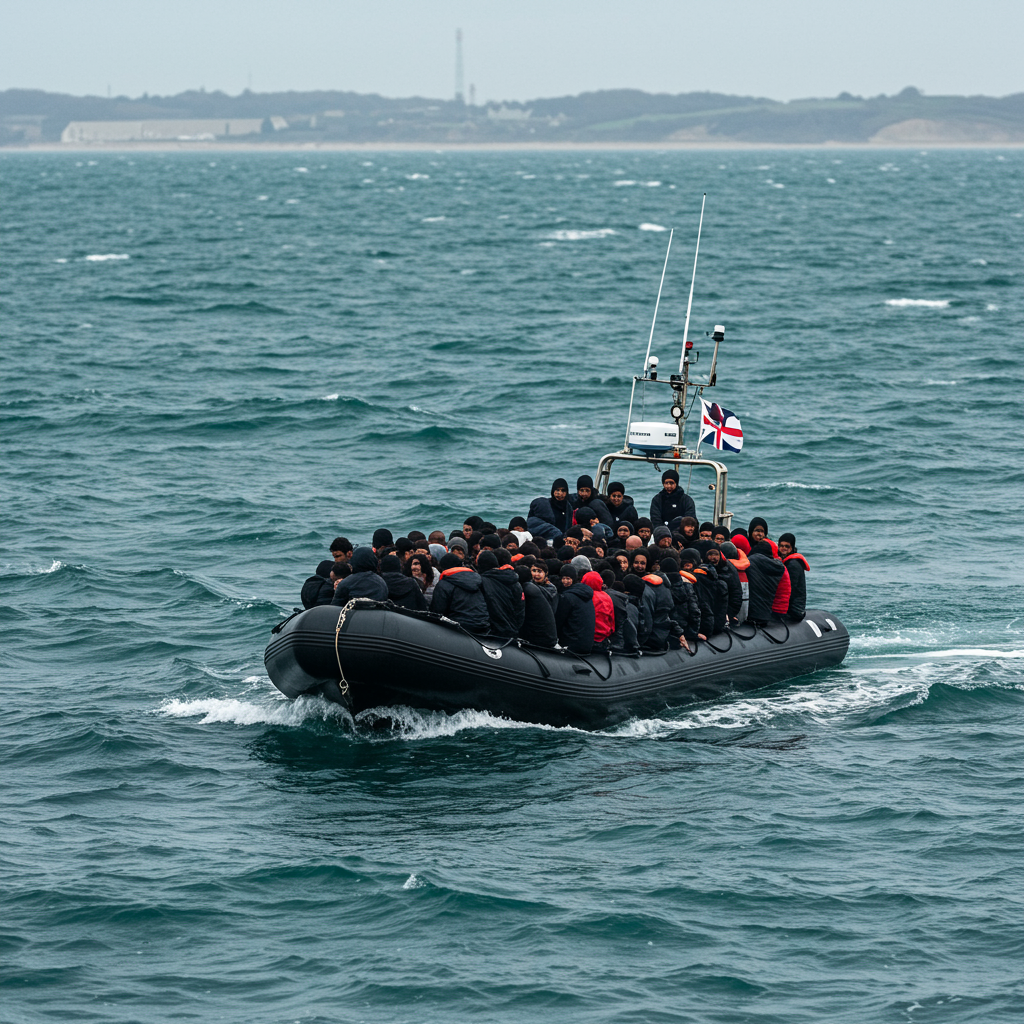The perilous journey across the English Channel in small boats has become a major political and humanitarian challenge. Despite significant efforts by both the UK and French governments to halt crossings, the number of arrivals continues to reach record levels in recent years. This has intensified the debate around why Channel migrants specifically choose the United Kingdom as their destination country, often bypassing other safe European nations. Understanding the complex motivations behind these dangerous crossings requires looking beyond simplistic explanations and examining a range of interconnected factors.
While leaders discuss “new and innovative solutions” and the UK invests hundreds of millions in French patrols, people continue to risk their lives at sea. This article synthesizes available evidence, expert analysis, and migrant perspectives to explore the key pull factors drawing individuals to the UK, alongside the critical push factors compelling them to leave their homes in the first place. It also examines the policy context and challenges surrounding this complex issue.
The Dangerous Journey: Scale and Context
The sheer scale of Channel crossings highlights the desperation involved. Official figures show a significant recent increase. In the first half of 2025, nearly 20,000 people arrived via small boats, marking a substantial rise compared to the previous year. By early July 2025, this figure exceeded 21,000, a 56% increase year-on-year for that specific timeframe. 2024 saw almost 37,000 detections, up 25% from 2023, though still below the 2022 peak of 45,755 arrivals. Since 2018, over 170,000 people have made this dangerous voyage.
These crossings are not only numerous but also increasingly deadly. At least 82 migrants died in 2024, making it the deadliest year on record for this route. By June 2025, at least 18 more lives had been lost. In total, over 247 people have died since 2018 attempting the crossing. Experts suggest increased cramming onto less seaworthy vessels contributes to the heightened risks.
It is crucial to view the UK Channel migrants situation within a broader European context. Asylum applications have risen sharply across Europe, not just in the UK, since 2020. Countries like Germany, France, Spain, and Italy received higher absolute numbers of asylum claims than the UK in 2024. While UK sea arrivals are significant, they remain lower than those recorded in Italy, Greece, or Spain in 2024.
Unpacking the “Pull Factors”: Why Britain?
Numerous factors contribute to an individual’s decision to attempt reaching the UK via the Channel. These motivations are often deeply personal and multilayered, driven by perceived advantages and existing connections.
The Allure of Opportunity and Safety
For many, the UK represents a perceived land of opportunity and a place where they can finally feel safe. Migrants interviewed in French camps frequently describe Britain as a “dream country.” They express a deep conviction that reaching the UK is their destiny and that it offers pathways to success. Individuals speak of aspirations for careers like journalism or engineering, believing these are attainable in the UK. One young man from South Sudan felt a historical connection to Britain due to past colonisation, stating he would “feel like I am home.”
Safety is a paramount concern. People fleeing conflict zones like Gaza describe escaping destruction and needing medical help their home countries cannot provide. Others simply state they will “feel safe” in Britain, seeking refuge from persecution and violence. The hope is to find stability and rebuild lives away from danger.
Language, Family, and Existing Connections
A significant practical draw is the English language. Many migrants do not speak French or other European languages and feel isolated or unable to integrate in transit countries. They perceive Britain as much more accessible and welcoming due to the language barrier being removed. The ability to communicate easily facilitates finding work, navigating daily life, and connecting with society.
Existing family links and social networks also play a critical role. Many individuals have friends or relatives already living in the UK. The desire to reunite with family members is a powerful motivator. Some aim to establish a new life in Britain specifically so they can eventually bring their families over, noting difficulties or perceived impossibilities in doing so from other European countries.
The Informal Economy Debate
A claim often cited by the French government is that the ability to “work without papers” in the UK’s informal economy acts as a significant magnet. This refers to employment where tax is not paid and workers lack legal status or proper documentation. While estimating the size of this hidden economy is difficult, a European Parliament study suggested it represented about 11% of the UK’s total economy in 2022. Interestingly, this was lower than estimates for France (14%) and the average across 31 European countries (17%).
The UK’s informal economy does potentially offer opportunities for asylum seekers and other irregular migrants to work illegally. The UK government acknowledges this and has increased enforcement efforts. Data shows a rise in visits to employers suspected of hiring unauthorised workers, resulting in more arrests and significantly higher fines issued to businesses in sectors like restaurants, nail bars, and construction. The potential introduction of a UK-wide digital identification system is discussed as a tool to combat this, though its effectiveness is questioned, given that some EU countries with similar systems still have sizeable informal economies.
Expert opinion adds nuance to this debate. Madeleine Sumption from Oxford University’s Migration Observatory expresses scepticism about the narrative that the UK is a “soft touch” on work rights compared to France. She notes that both countries have broadly similar policies and face comparable challenges with unauthorised workers. Her research suggests that factors like speaking English and having family links in the UK are more significant pull factors than perceived ease of working illegally.
State Support and Welfare
The level of state support available is another area debated as a potential pull factor. Most asylum seekers cannot access mainstream welfare benefits in the UK. However, they are entitled to certain legal protections while their claims are processed. This includes accommodation if they cannot support themselves financially. They receive a small weekly allowance loaded onto a pre-paid debit card (£49.18 for self-catered accommodation, £9.95 for catered).
Asylum seekers also generally have free access to the NHS. Children of asylum seekers are entitled to state education and may qualify for free school meals. Some limited free childcare is also available. This contrasts with the situation for many migrants in Calais who have not claimed asylum in France and receive only limited charity support.
Despite the availability of basic support, research indicates that benefits are generally not a significant draw for asylum seekers. Studies suggest that factors like the likelihood of receiving refugee status recognition and the ability to reunite with family are more influential in destination choice. Research also indicates that border controls and processing policies have a greater deterrent effect than welfare policies. Experts conclude that minor adjustments to the benefit system are unlikely to have a major impact on migration flows.
The Role of Smugglers and Perception
People smugglers actively promote the idea that the UK is a desirable destination. They sell the Channel crossing journey by cultivating a “general impression that the UK is a good place to live.” This narrative, combined with limited safe and legal routes, pushes individuals towards relying on criminal networks for passage.
Push Factors: The Driving Force
While pull factors in the UK are important, researchers stress that understanding the overall increase in asylum seekers requires acknowledging the critical role of “push factors.” These are the conditions in people’s home countries that compel them to leave. Conflict, repression, human rights abuses, and lack of safety are primary drivers. Difficult circumstances and limited prospects in transit countries also contribute to the decision to continue moving towards the UK. Ultimately, the lack of accessible, safe, and legal pathways to seek protection forces many onto irregular and dangerous routes.
Addressing the Issue: Policies and Challenges
Both the UK and French governments are actively working to reduce Channel crossings, though with limited success so far. The UK has committed substantial funding (£500 million over three years) to support French efforts to stop boats leaving the coast. Discussions include potential “new and innovative solutions,” such as French police intervening against “taxi boats” near the shore and a potential “one-in, one-out” returns agreement where the UK might accept a person with family ties for each small boat arrival returned to France. French President Emmanuel Macron emphasizes the need for shared responsibility and wider EU support.
The UK government has also implemented tougher domestic measures. These include increased penalties for suspected people smugglers, new offences for endangering lives at sea, and significantly tightened rules around citizenship for those arriving via small boats, making it almost impossible for tens of thousands. Proposed changes also aim to extend deportation eligibility for asylum seekers convicted of sexual offences. A £150 million Border Security Command is being established.
However, these enforcement-heavy strategies face criticism. Some experts and advocacy groups argue that they push smuggling gangs to take greater risks, inadvertently increasing the danger and death toll in the Channel.
There is also an ongoing debate about the language used to describe individuals making these journeys. Organisations like the International Rescue Committee argue strongly against using the term “illegal migration,” particularly when referring to people seeking asylum. They explain that using “illegal” is dehumanising and inaccurate because international law, including the Refugee Convention which the UK helped create, allows individuals to claim asylum once they are present in a country, regardless of their entry method, precisely because safe routes are often non-existent. They advocate for the term “irregular migration,” which acknowledges that people are forced to use unofficial routes due to a lack of safe pathways. They highlight that most small boat arrivals immediately claim asylum, and a high percentage are subsequently found to need protection.
The complex interplay of push factors, varied pull factors in the UK (including language, family, and perceived opportunity/safety), and the lack of safe alternatives means there is no single simple answer to why people risk crossing the Channel. While enforcement efforts continue, the motivations remain strong, and the human cost continues to rise.
Frequently Asked Questions
What are the main reasons migrants cite for choosing the UK via Channel crossings?
Migrants cite several key factors for choosing the UK. These include the English language, which many already speak and find easier than French. Existing family members or social connections in the UK are also a major draw. Perceived safety, the hope for better opportunities, and the general impression of the UK as a good place to live are also significant motivations.
Is access to benefits or the ability to work the primary reason migrants come to the UK?
Research presented in the article suggests that access to welfare benefits is generally not a primary pull factor for asylum seekers. While basic support like accommodation and a small allowance is provided, experts indicate that other factors like the possibility of family reunion and the likelihood of receiving refugee status are more influential. While the UK’s informal economy offers potential illegal work opportunities, its size relative to other European countries and expert skepticism suggest it is not the sole or main driver.
What are the UK and French governments doing to address Channel crossings?
The UK and French governments are cooperating to reduce crossings. The UK provides significant funding to France for patrols. Discussions involve potential “new and innovative solutions,” such as French police targeting ‘taxi boats’ and a potential ‘one-in, one-out’ returns agreement. The UK is also implementing tougher measures against people smugglers, tightening immigration rules for small boat arrivals, and establishing a new Border Security Command.
Conclusion
The decision to undertake the perilous journey across the English Channel is driven by a complex mix of factors. While attention often focuses on potential “pulls” in the UK, such as language, family ties, and perceived safety or opportunity, the crucial “push” factors – conflict, repression, and lack of safe alternatives – are fundamental drivers. The debate around the significance of welfare or the informal economy as pull factors is nuanced, with research suggesting they may be less influential than other personal and systemic reasons. Addressing this ongoing crisis effectively requires not only enforcement measures but also a deeper understanding of the multifaceted human motivations and the structural lack of safe, legal pathways that leave desperate individuals with few other options.



